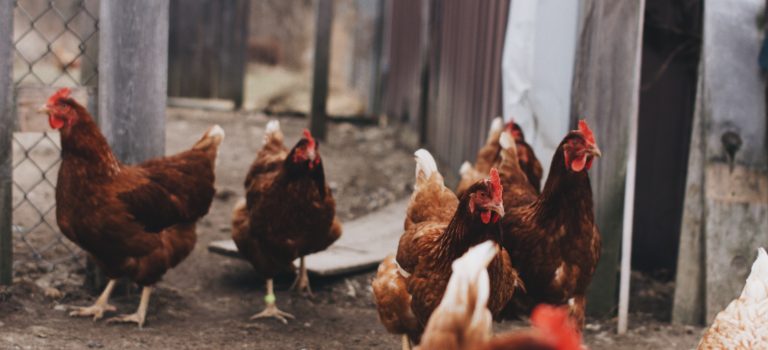Cleaning your chicken coop regularly ensures that your hens are living in an environment that is conducive to their health. It prevents illness and helps them thrive to encourage increased egg production.
Daily Clean
Daily cleaning your chicken coop simply involves removing droppings from the coop. You should not allow manure to accumulate as this will smell. It also helps deter bugs and neighbors’ complaints. Chickens usually poop while they sleep. You will find the greatest concentration of it on their roosting perch. Daily cleaning should also be done to their feeders, waterers and dust baths.
Deep Litter Clean
In the “deep litter” method of coop bedding, you are basically creating a compost of your chicken’s poop right on the coop floor. You start with a first layer of pine shavings, leaf litter or corn cobs. As the chickens scratch waste into the litter, the resulting mixture of carbon and nitrogen neutralizes odours. Simply add shavings on a weekly basis to keep the floor composting nicely. Scatter corn on top to encourage the chickens to scratch, thereby aerating the compost pile. Remove only the damp/wet or soiled bedding on a weekly basis. Microbes that form in that compost pile are highly beneficial to your chickens. Sprinkle food-grade diatomaceous earth (DE) powder on the coop floor before you lay down the bedding to further absorb moisture.
Monthly Clean
The monthly routine involves changing the bedding with a fresh layer of shavings while collecting the old bedding to be used as nitrogen-rich fertilizer for your garden.
The Big Clean
Deep cleaning should be done about twice a year, depending on flock size. This is also the perfect time to assess whether anything is broken or needs to be replaced, such as holes in the wall or netting. Start by placing your chickens in an area well away from the coop that you are cleaning. Remove all manure, shavings and chicken accessories. Remove feeders, waterers and dust bath boxes. Clean and dry them thoroughly before refilling. Scrub down the floor, walls, roosting bars, and nesting boxes. Disinfect and dry them thoroughly as well. Return all the clean and dry accessories, place fresh bedding and let your chickens back into the coop to enjoy their freshly cleaned living quarters.
It is also imperative that you clean your coop before introducing any new additions to your current flock.
How to Clean Chicken Coop
Day-to-day cleaning may be done by simply mixing equal parts of white or apple cider vinegar and water. Hose down the floor, walls, roosts and nesting boxes with water first, to remove fine dust and soften manure or dirt. Slosh the vinegar mixture as generously as you can, then take your broom or brush and give everything a thorough scrubbing. A final hose down of water will round up your cleaning activity very nicely. Finally, open up all doors and windows and let everything air dry completely. Here is where the ventilation you put in will work to its best advantage.
Disinfecting or sterilizing the coop using chemical agents is extremely vital anytime you bring new chickens into the coop or after they have been ill. Any lingering bacteria in the coop may just re-infect your chickens over and over again. Bleach is a very common and effective disinfectant but it contains harsh chemicals that may adversely affect you and your chicks. You can consult a veterinarian for a proper general disinfecting/sterilizing agent and a specific product to eliminate a particular bacteria or disease from your coop.
Cleaning your coop using all-natural solutions may be a little more time-consuming but it will be safer, cheaper and more environment-friendly.
How to stop smells in the chicken coop
A clean coop is a smell-free coop. If you are able to clean regularly, bad smells will not accumulate and stink up your coop. If you want that little extra scent to permeate your chickens’ house, there are a few all-natural mixtures you can adopt.
A solution of 120 ml of vinegar and baking soda in a 2-litre spray bottle works well to keep the coop always smelling fresh. To make this cleaning solution sweet-smelling, you can add herbs such as lavender, vanilla, and mint.
Add the rind of 5 lemons and 1 cup of brown sugar to a 2-litre spray bottle and shake until the sugar dissolves. Let this sit for at least 3 months, then strain the mixture and you have a lemoncello cleaner.
Place lemon and orange peels in a jar then pour white vinegar on top. Let this sit for several days or up to 2 weeks, then strain into a spray bottle. This is a nice-smelling citrus-based cleaner/deodorizer for your chicken coop that is an excellent insect repellent, too.
Cleaning your chicken coop regularly ensures that your hens are living in an environment that is conducive to their health. It prevents illness and helps them thrive to encourage increased egg production.
